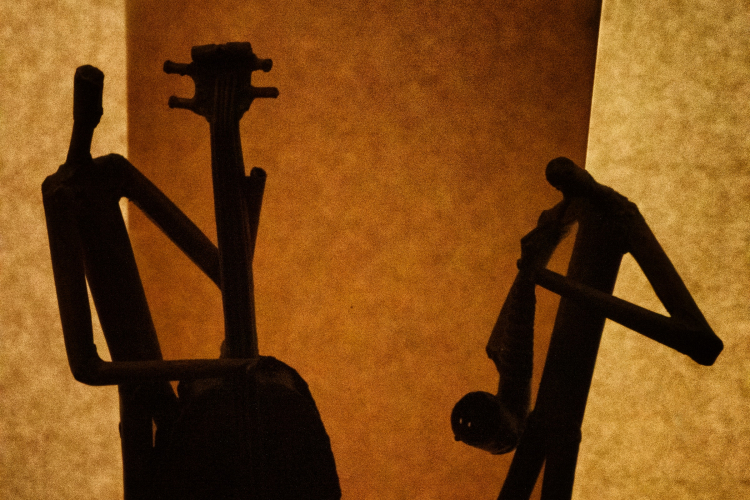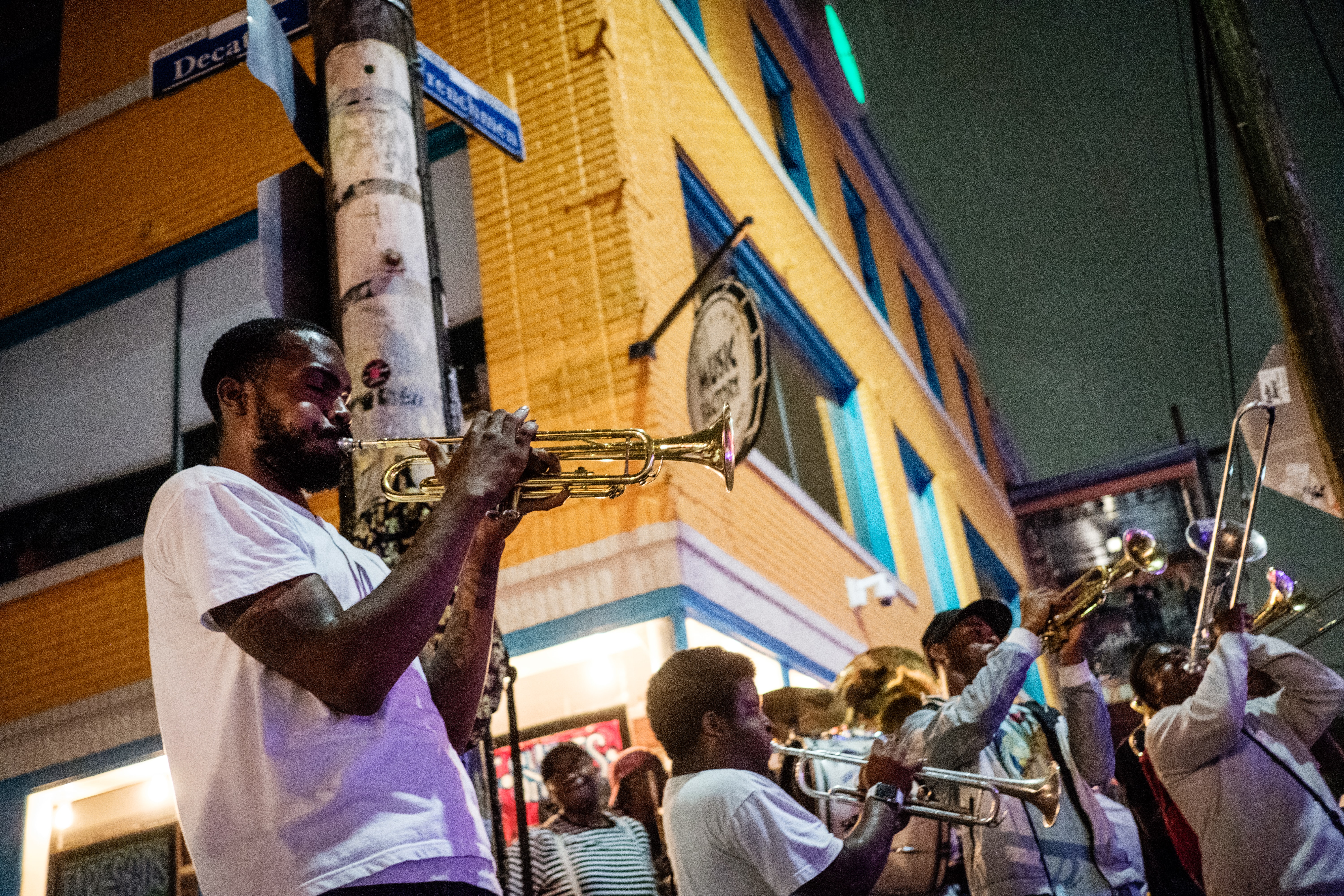The Big Noise

New Orleans, 1930, Louis Armstrong gives a jazz music show in front of a large white audience. This scene took place in a fancy atmosphere where wealthy people were swinging to the jazz concert while drinking liquors and lighting up cigarettes.
During his performance, Satchmo (Armstrong’s nickname) decided to introduce his next song with a short story he experienced when he was a kid, in this same city of Louisiana, as a tribute to his music influences and to the artists who played an important role in the recent development of jazz music.
The story started with Armstrong in his young years, walking at night in his neighborhood, when he suddenly heard, from one of the dancing bars, a melody he had never heard before. This song was deeply sorrowful to the point Louis Armstrong went talk straight to the musician himself, right after the performance. He asked the frontman why he was playing so sad a song. First, in reaction to Armstrong’s question, the musician acted surprised. After a short blank, the trumpeter answered him that this day was marked by a tragic event, the loss of "the King". The first King of New Orleans' music, Buddy Bolden, the man who marked a new era for music as well as a possible emancipation for the African-American community in these intense segregationist times had been taken away.
Photo credit: Diego Mora Barrantes/UnsplashBut who was Buddy Bolden?
Many aspects of his life actually remain a mystery. However, Buddy Bolden deserves credit for starting it all. Indeed, the man who provoked the big noise in jazz was Buddy Bolden, a talented trumpet player.
Charles ‘Buddy’ Bolden was born in September 6, 1877, in New Orleans, Louisiana. Bolden could not withstand for long the call of music, from the blues to the French opera, that filled the air of his hometown. By the early 1900s, he led the most successful band in New Orleans and inherited the nickname of King Bolden. He quickly became considered as the leading figure of the rising New Orleans-style ragtime music, later known as jazz.
From the church, Buddy Bolden’s innovation was one of personality, characterized by the unique sound of his cornet. At that time, music was essentially a written thing, from classical music to military marches. With Buddy Bolden, music started to become a living thing with the notion of improvisation into it. This aspect of jazz music might be, to some extent, explained by the fact that Bolden, like many of his contemporaries, could not read music.
Photo credit: Yoel J Gonzalez/UnsplashInnovative, loud and always eager to surprise and thrill his listeners with the richness of his musical ideas, Bolden was different from every other cornet players.
Buddy Bolden invented that beat called ‘the big four’. On the 4th beat, the drum and the cymbal hit together. As a result, it emphasizes the last beat of each bar. This element of jazz music represents one of the innovations which made this genre delightful.
Such as other New Orleans musicians in the beginning of the 20th century, Buddy Bolden played everything like waltzes, rags and spirituals. However, he remains best remembered for his hot music. To be more specific, nobody had never heard something like Buddy Bolden signature before. It seemed that the sound of Bolden’s trumpet was a cherished memory to those who had heard it and its evocation carried a spirit of rebellion and hope inside of the African-American community.
Bolden was especially beloved in the black section of the wild open red light district of New Orleans, called Storyville. There, after midnight, the repertoire changed and night people took over. This is when the blues and the slow rags really began to predominate.
Actually, there was nothing like this anywhere else in the United States. In other words, New Orleans was the hot beat of that type of sexual activity. Many people, at that time, wanted to come over Storyville and sort of checking these things out. The apogee of Bolden’s career coincide with the best years of Storyville.
Photo credit: Morgan Petroski/UnsplashIn jazz music, there is this phrase saying that it’s beautiful and it’s also terrible; that jazz is real and deals with depraved activities because the musician saw and experienced all of these things. That’s what gives their music its bite in feelings as an answer to the listeners’ desires.
As the cost to be paid, Buddy Bolden was a heavy drinker as well as a drug addict and thus developed intense headaches. He began to talk to himself, to quarrel with his band members and to worry constantly that other musicians would copy him or that their innovation would overshadow his own. Bolden had been diagnosed with schizophrenia and seemed frightened of everything.
In 1906, after years of an unchallenged popularity in New Orleans, his health seriously began to deteriorate. In September of the same year, Buddy Bolden was engaged to play in another parade, just as he had done for years. However, somewhere along the cortege, he suddenly walked away from the other marchers.
Despite his mother’s efforts to calm his fears, nothing seemed to help. Six months later, she was forced to call the police, afraid her son would hurt her or himself.
Buddy Bolden, the man who had led the first jazz band would never play his horn in public again. He would spend the rest of his life in the Louisiana State Insane Asylum at Jackson.
Photo credit: Chris Bair/UnsplashBuddy Bolden left almost nothing material behind him, only a single photograph of him survived to this day. In addition, while Bolden reached his apogee in the late 1890s, the practice of recording was still in its first steps. Willie Cornish, his trombonist, recalled making a phonograph cylinder with the Bolden band, but no known remaining copies of it exist.
Nevertheless, Buddy Bolden left an overwhelming reputation which survived him through times. His contribution led to the evolution of music and to the birth of several different genres as well as participated in the emancipation of the African-American culture.
Bolden’s lifestyle, as a maledictory legacy, would haunt many other musicians especially in jazz, rock and hip-hop music.
Buddy Bolden’s story enhances the fact that a music genre is much more than music itself. It goes way further than a style of music by also representing personality, lifestyle, ideas and major society evolutions. Even if a music genre is not as trendy as it used to be, its impacts remain everywhere around us, like invisible because already anchored in our social codes. In this sense, what would you think about the famous phrase ‘Rock is dead’?











